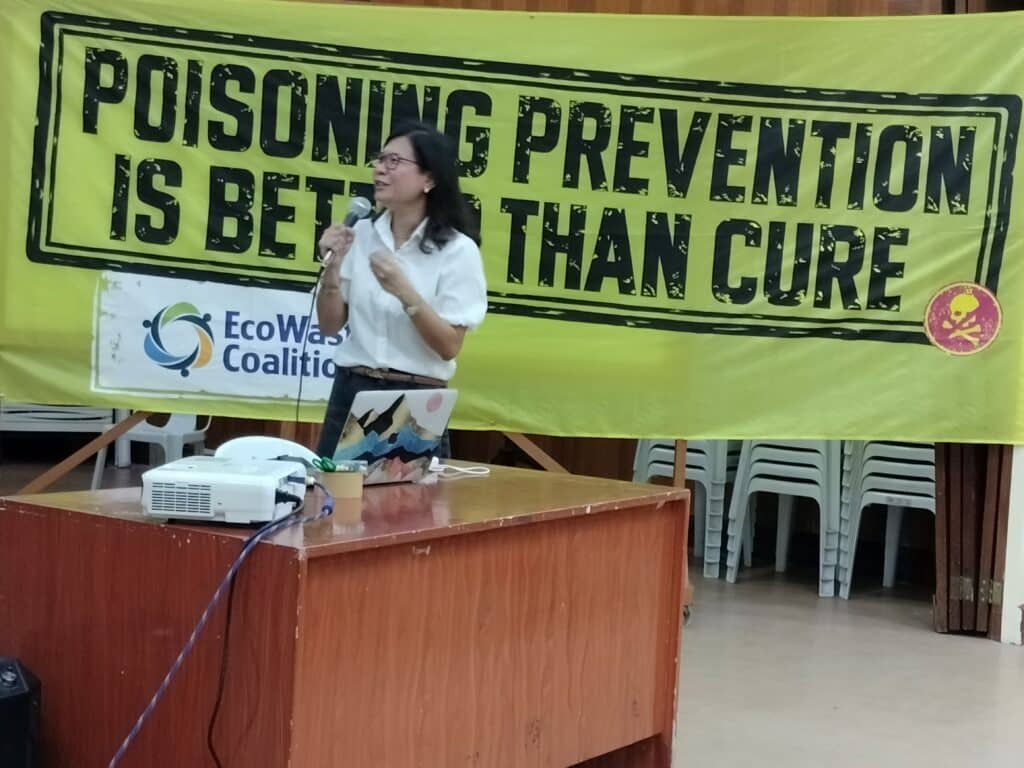With a big banner that says “poisoning prevention is better than cure” as the backdrop, a seminar held on June 22 at the University of Cebu (UC) – Banilad Campus put emphasis on preventive steps to safeguard family members, especially young children, from substances that can cause illness or even death.
Co-organized by the Quezon City-based EcoWaste Coalition and the Cebu-based Philippine Earth Justice Center (PEJC), UC Office of Legal Aid and the UC Law Green Legal Clinic, the seminar drew close to 50 community participants from Cebu, Mandaue, Naga and Talisay Cities.
Held in observance of the yearly National Poison Prevention Week (NPPW) every last week of June, the seminar raised the awareness of participants about the sources, signs and symptoms of poisoning and its effects on human health, and imparted practical ways of preventing poisoning, especially at home. The theme for this year’s NPPW is “Community and Collaboration: Uniting to Prevent Poisoning.”
Moreover, the seminar discussed the effects of lead on human health, lead paint and dust as a major source of lead exposure among children, and the corresponding efforts of the EcoWaste Coalition to promote policies and measures to prevent and reduce exposure to lead, a potent neurotoxin (a poisonous substance that can damage the nervous system).
Cebu-based Dr. Kathlynn Joy Pañares, a diplomate of the Philippine Pediatrics Society (PPS) and associate member of the Philippine Society of Clinical and Occupational Toxicology (PSCOT), gave an overview of poisoning, which, according to the World Health Organization (WHO), “is a time-dependent emergency and, like infectious diseases, may require a specialist for appropriate diagnosis and treatment.” She reported that based on the surveillance and management of poisoning cases by the poison center at Vicente Sotto Memorial Medical Center (VSMMC), the top five leading causes of poisoning in 2023 were snake bites, pharmaceutical agents, industrial products, household cleaning supplies, and pesticides.

As most poisoning incidents happen in people’s homes, particularly in the kitchen, bathroom and bedroom, Pañares reminded the participants to store all over-the-counter and prescription medicines, health supplements, household cleaning products, personal care and cosmetic products, insecticides and pesticides in their original containers and out of children’s reach, and to contact the VSMMC Poison Control Hotline at 0918-9482623 for poisoning information and advice.
Chemist Jeiel Guarino, Global Lead Paint Elimination Campaigner of the International Pollutants Elimination Network (IPEN), discussed the health effects of lead exposure, which can harm multiple body systems, citing information from a module prepared by the WHO and the Global Alliance to Eliminate Lead Paint. “Health experts say that there is no known level of lead exposure without harmful effects as even low doses of lead causes lifelong, irreversible impacts to a young child. Therefore, removing lead paint as a source of exposure will have significant health, economic, and societal benefits,” he emphasized.
Manny Calonzo, EcoWaste Coalition’s Campaigner, highlighted the importance of the DENR-issued Chemical Control Order (CCO) banning lead additives in paint production, which energized the group’s campaign for 1) department-wide policies and local government ordinances directing the mandatory procurement and use of lead safe paints, 2) the promotion of paint manufacturers’ voluntary participation in the third-party Lead Safe Paint® Certification, and the 3) identification and removal from the market of assorted products and accessories laden with lead. “We hope to further our campaign achievements in preventing lead poisoning as this will surely contribute to the fulfillment of the human right to a clean, healthy and sustainable environment.”
Proclamation No. 1777 issued in 2009 called for the annual observance of the NPPW to raise poisoning awareness, promote preventive measures, and encourage collaboration among various stakeholders in order to reduce poisoning cases and deaths in the country. The DOH and PSCOT are tasked to take the lead in organizing activities to mark the NPPW. (PR)

